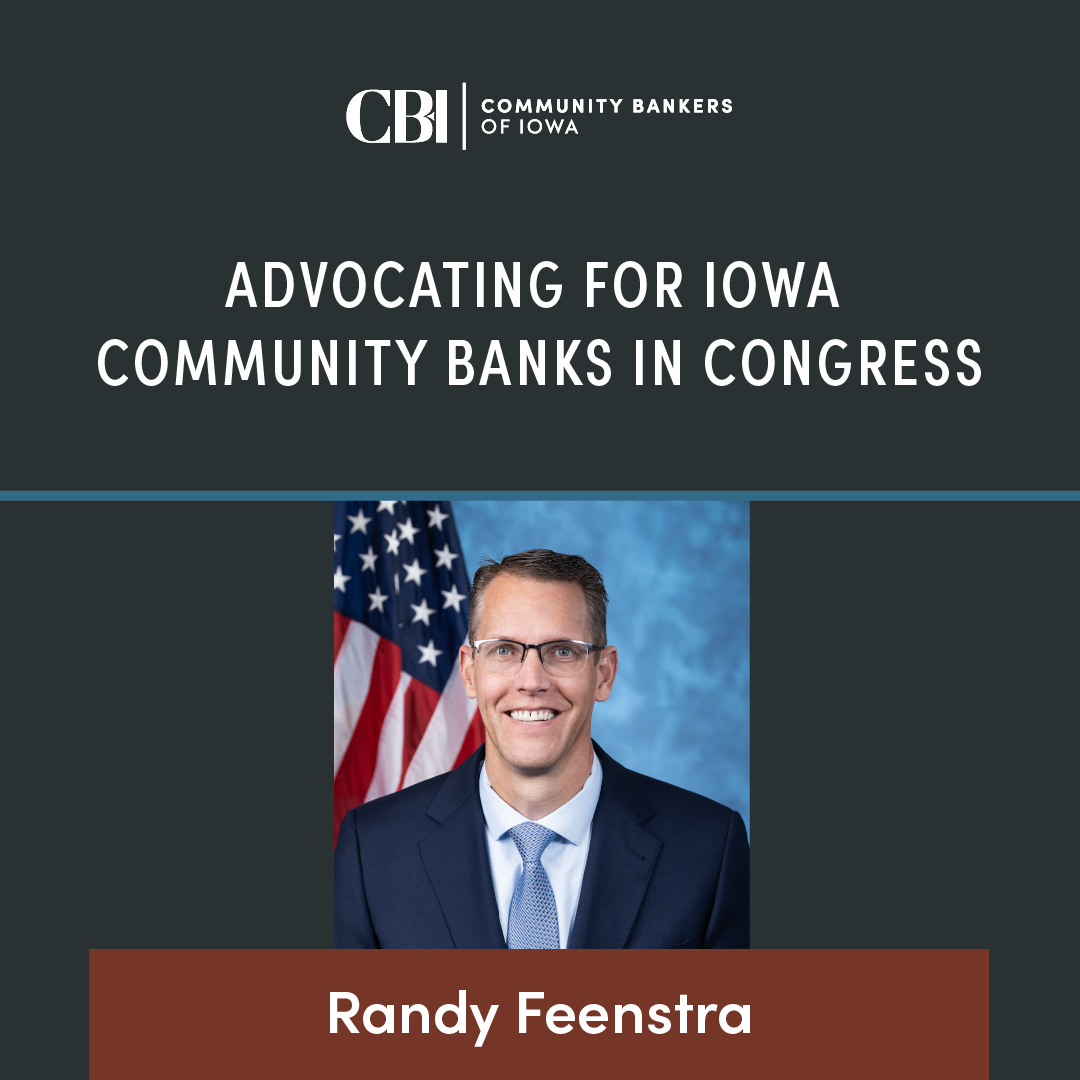Advocating for Iowa Community Banks in Congress

For nine years, I worked as an insurance manager at Iowa State Bank in my hometown of Hull overseeing the insurance divisions across nine banks and selling health, crop, and property/casualty insurance myself. My time at ISB reinforced my already positive views of community banks, connected me to my neighbors on a deeper level, and, to this day, still informs my work serving Iowa on both the House Ways and Means Committee and the House Agriculture Committee. My promise to you is that I will always be an unwavering advocate for our community banks and the families, farmers, and businesses that they serve.
Community banks play a pivotal role in strengthening our economy, investing in our communities, and financing local projects and expansions that grow rural Iowa. Out of the more than 4,500 banks that constitute the federal banking landscape, 97% are community banks – serving tens of millions of Americans. According to the Independent Community Bankers of America, community banks also originate roughly 60% of all small business loans and 80% of all agricultural loans. These statistics confirm the importance of community banks to our rural communities and underscore the stability and certainty that these local institutions bring to our financial ecosystem in Rural America.
However, having worked in the private sector, I know that burdensome government regulations and unfair tax policies can significantly inhibit any business’s ability to succeed, including our community banks. That’s why I have introduced legislation to provide tax relief to our community banks and have spoken out against unnecessary red tape that stifles capital deployment and makes loans more expensive to offer.
My top priority for our banking community is passage of the Access to Credit for our Rural Economy Act – also known as the ACRE Act for short. This legislation brings parity to the financial services sector by giving greater flexibility to more financial institutions like community banks to offer affordable lines of credit to rural and agricultural borrowers. Over the last few years, the dream of homeownership has quickly evaporated for many Iowans – especially young families – with interest rates spikes making borrowing more costly. Farmers have also faced real financial struggles with the skyrocketing cost of seed, feed, labor, and other inputs, yet taking out a loan to cover expenses also remains infeasible with interest rates at current levels. This is where the ACRE Act has the potential to be a gamechanger.
As a matter of policy, this bill would amend IRS code to level the playing field for community banks to administer agricultural real estate loans by granting them tax exempt status on earned interest. This same exemption already applies to farm credit institutions, and there’s no reason why it should not apply to our community banks. More specifically, this exemption would apply to single-family home mortgage loans in rural communities with fewer than 2,500 residents and for mortgages less than $750,000. These parameters will help ensure that capital can be invested in rural areas, families can plant their roots in rural communities, and farmers and businesses on Main Street can continue to generate economic activity in Rural America. In fact, according to the American Bankers Association, this legislation would expand access to affordable agricultural and home loans to over 4,000 rural communities nationwide and save family farmers and producers well over $400 million in annual interest expenses. Industry estimates also project that the ACRE Act would save farmers $950 million in costs annually, lower rates on home loans anywhere between 0.5% and 1.5% resulting in roughly $200 million in interest savings, and produce $1.15 billion in annual interest savings for families and farmers in rural areas across the country.
In addition to leveling the playing field for our community banks to fairly compete, we need to get government out of the way when it comes to efficiently operating community banks. Per the 2024 Conference of State Bank Supervisors Annual Survey of Community Banks, 89% of community banks polled signaled regulations as either an “extremely important” or “very important” external risk. That is a very concerning figure and should be a wake-up call for Congress and bureaucrats in Washington to back off our community banks that are just trying to serve their customers to the best of their ability.
During a House Agriculture Committee hearing several months ago, I highlighted the devastating impact that the Biden administration’s enforcement of Section 1071 of the Dodd-Frank Act would have on our community banks and rural communities. As you are aware, this mandate would require community banks to report every detail of every loan they prepare to the federal government. It’s invasive, costly, and wrong. It would effectively drain rural areas of needed capital, make loans unaffordable for our families, and put community banks out of business. Of course, regulators never seem to consider the disastrous ramifications of their actions – instead opting, in this case, to make running a community bank more expensive and less feasible. I voted for a congressional resolution to overturn this burdensome rule, and I will continue to work to ensure that this reckless decision is rescinded as quickly as possible.
Representing our community banks is an important focus for me in Congress. Like I’ve told my colleagues, we need to advance policies that help our community banks serve our neighbors and gut regulations that needlessly make banking more expensive and less accessible in rural areas. Having worked at a community bank, I pledge that I will always be in your corner and advocate for a stronger and more prosperous future for our community banks and local lending.
